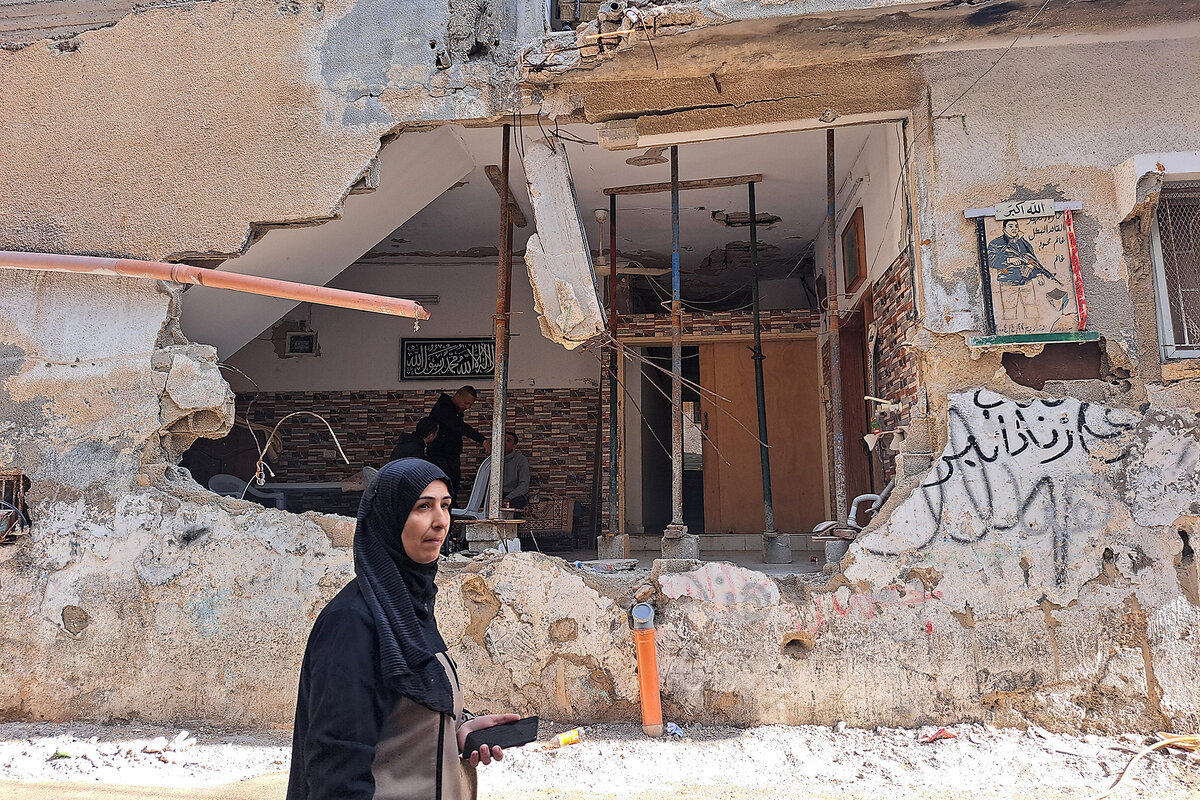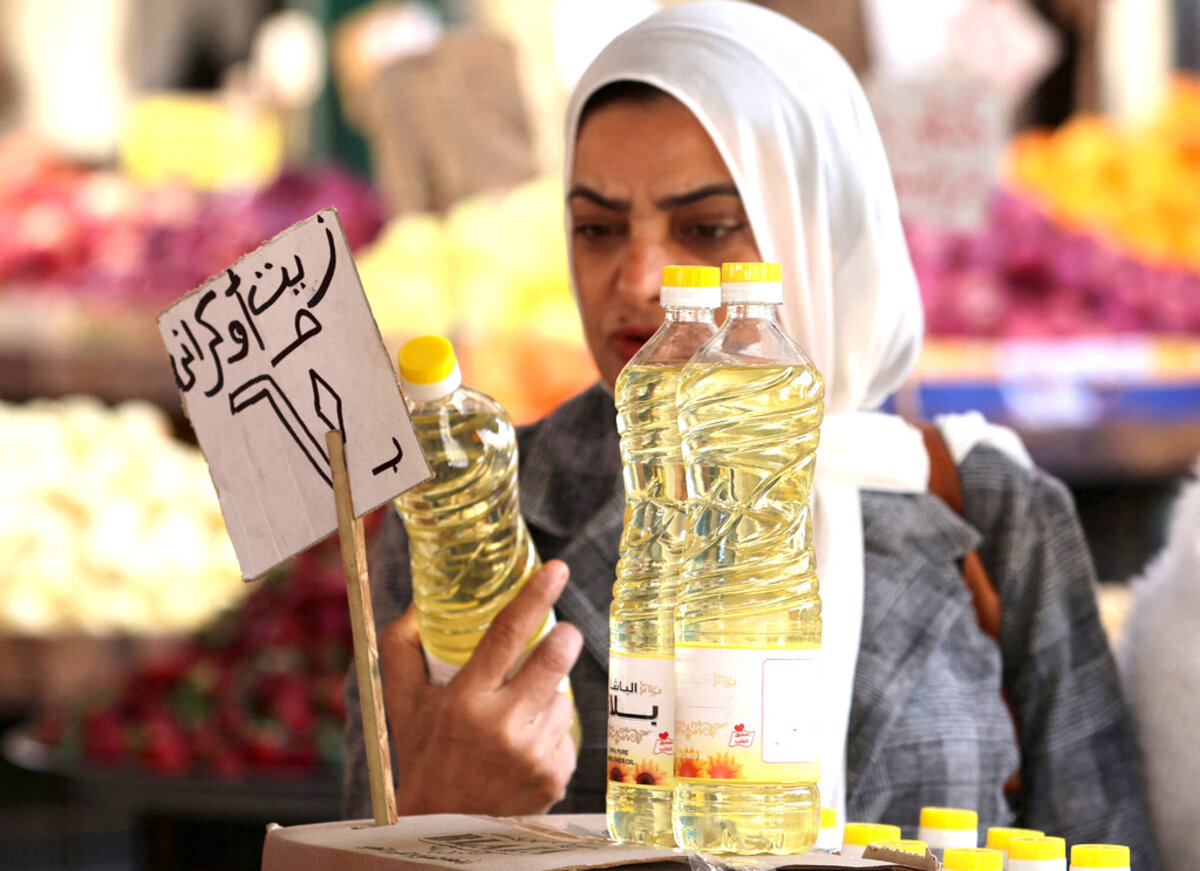From the first shots of the war in Gaza, Israel was warned – and knew – that its military tactics in densely populated civilian areas would only sow extremism. That destructive dynamic is replaying in the West Bank’s refugee camp communities.

Why is Christian Science in our name?
Our name is about honesty. The Monitor is owned by The Christian Science Church, and we’ve always been transparent about that.
The Church publishes the Monitor because it sees good journalism as vital to progress in the world. Since 1908, we’ve aimed “to injure no man, but to bless all mankind,” as our founder, Mary Baker Eddy, put it.
Here, you’ll find award-winning journalism not driven by commercial influences – a news organization that takes seriously its mission to uplift the world by seeking solutions and finding reasons for credible hope.
Explore values journalism About usMonitor Daily Podcast
- Follow us:
- Apple Podcasts
- Spotify
- RSS Feed
- Download
You follow the news. You can be forgiven for thinking that America is a political pushmi-pullyu: one body with a couple of divergent (and horned!) heads.
The presumption of hopelessness that suggests around, well, ever getting anywhere, is overblown.
That’s a central finding by Marshall Ingwerson, a special contributor and former top editor of the Monitor. The extremes get all the attention. But as he wrote recently – and talks about today in our weekly podcast – when it comes to most issues, hyperpartisanship is mostly what the performative fringe is selling.
Confident, free thinking counters that. And where thought is shifting, it’s often in the same general direction.
Already a subscriber? Log in
Help fund Monitor journalism for $11/ month
Monitor journalism changes lives because we open that too-small box that most people think they live in. We believe news can and should expand a sense of identity and possibility beyond narrow conventional expectations.
Our work isn't possible without your support.
Today’s stories
And why we wrote them
( 6 min. read )
Today’s news briefs
• State of the Union set: President Joe Biden delivers his third such address at 9 p.m. Eastern time tonight. One of the year’s biggest pieces of political theater, it will be carefully scrutinized as he runs for reelection.
• Texas wildfires investigated: Officials in Texas say power lines ignited massive wildfires across the state’s Panhandle region that destroyed homes and killed thousands of livestock last week.
• EU leader endorsed: European Commission President Ursula von der Leyen wins backing of the European Union’s leading political group, the center-right European People’s Party, to head the bloc’s powerful executive for another five years.
• An IVF protection: Facing pressure to get in vitro fertilization services restarted in Alabama, Republican Gov. Kay Ivey signs legislation into law shielding doctors from potential legal liability raised by a court ruling that equated frozen embryos to children.
• Fatal Gulf of Aden raid: The first fatal attack by Yemen’s Houthi rebels on Red Sea shipping March 6 threatens to disrupt maritime global trade further and carries with it risks beyond those just at sea.
Patterns
( 4 min. read )
Vladimir Putin will win the upcoming Russian elections. But who will win the argument in Europe over just how assertively to defend Ukraine and guard against future Russian aggression?
Podcast

Where do Americans place trust? The answer may surprise you.
Partisan side-taking is real, but it’s not the whole story. Filter out the manufactured distrust from the extremes, and you can find data to support public agreement on big issues. Our writer found that counternarrative, then joined our podcast to talk about it.
A Narrative Missed by the News
( 8 min. read )
And here’s a case study in trust-building. Beyond the glare of national immigration debates, people in small cities like Herriman, Utah, are quietly working with new arrivals, to promote self-reliance and a strong community.
( 5 min. read )
This next story, too, is anchored in Utah, though it’s also a broader one. A recent wave of flag redesigns points to how a strong visual identity can bring residents together. The challenge states face, though, is how to agree on symbols that represent everyone.
The Monitor's View
( 2 min. read )
One reason for giving foreign loans to countries with faltering or even corrupt regimes is to coax them into honest and fair governance. The loans often come with a condition for belt-tightening. In a multibillion-dollar agreement brokered yesterday to lift Egypt out of an economic crisis, the International Monetary Fund has flavored a demand for prudence with subtle sweeteners.
The deal, which remains to be approved by the IMF board, ties $8 billion in loans to stabilizing Egypt’s currency, bringing down inflation, and wresting the economy from control by the state and military. Cairo has been dragging its feet on such measures for years. What may have brought a change now is the lending agency’s acknowledgment that the conflict in neighboring Gaza has imposed “significant macroeconomic challenges” on Egypt.
Such empathy carries a hint of gratitude for Cairo’s ongoing work to end the war in Gaza and return Israeli hostages held by the militant group Hamas. A key lesson from decades of international lending, said former World Bank Director Khalid Ikram, is the need “to have a more humble approach.” Sometimes that means tempering “economic purity with the politically doable,” he added.
Like other governments in the Middle East, Egypt has sought to avoid taking economic steps that might lead to a popular uprising, such as the Arab Spring of the early 2010s. The country’s current crisis is rooted in runaway spending on infrastructure projects and policies that protected the military’s influence in state enterprises. From 2014 to 2022, under President Abdel Fattah al-Sisi, Egypt’s foreign debt rose from $40 billion to $155 billion.
Talks between the government and the IMF were stalled from late 2022 until last month, when Cairo brokered a $35 billion deal with the United Arab Emirates for investments in urban development. The change in Egypt’s balance sheet offered an opening for renewed dialogue with the IMF. Egypt raised its interest rates by 600 basis points yesterday and floated its currency to reflect its true value. The IMF reciprocated immediately, more than doubling a stalled rescue program.
Those measures may help offset the financial impact of the Israel-Hamas war, including lost revenue from a decline in ship traffic through the Suez Canal due to attacks on ships by Houthi rebels in Yemen. More important for ordinary Egyptians, the measures coaxed concessions from an unpopular government that economists say will boost private enterprise – and a note of humility from the IMF.
“Egypt’s international and regional partners will play a critical role in facilitating the implementation of the authorities’ policies and reforms,” the agency stated. “The IMF team would like to thank the authorities for the constructive dialogue, warm hospitality and strong cooperation to finalize the reform package.” In diplomacy, soft gestures are often persuasive.
A Christian Science Perspective
Each weekday, the Monitor includes one clearly labeled religious article offering spiritual insight on contemporary issues, including the news. The publication – in its various forms – is produced for anyone who cares about the progress of the human endeavor around the world and seeks news reported with compassion, intelligence, and an essentially constructive lens. For many, that caring has religious roots. For many, it does not. The Monitor has always embraced both audiences. The Monitor is owned by a church – The First Church of Christ, Scientist, in Boston – whose founder was concerned with both the state of the world and the quality of available news.
( 2 min. read )
Here are four examples of why there’s good reason for relying on God to take care of us.
Viewfinder

A look ahead
Thanks for being here today. Tomorrow we’ll explore what President Joe Biden achieved (or didn’t) in his State of the Union address. We’ll also have a report from Ukraine’s eastern front with Russia, looking at what a lack of U.S. weapons and ammunition has meant for Ukrainian forces there.








